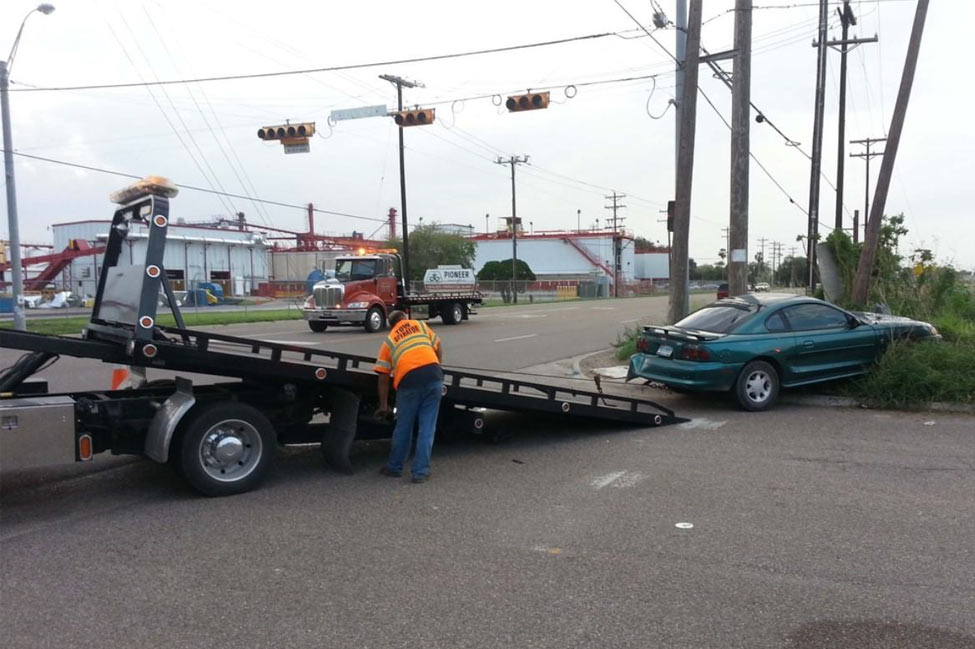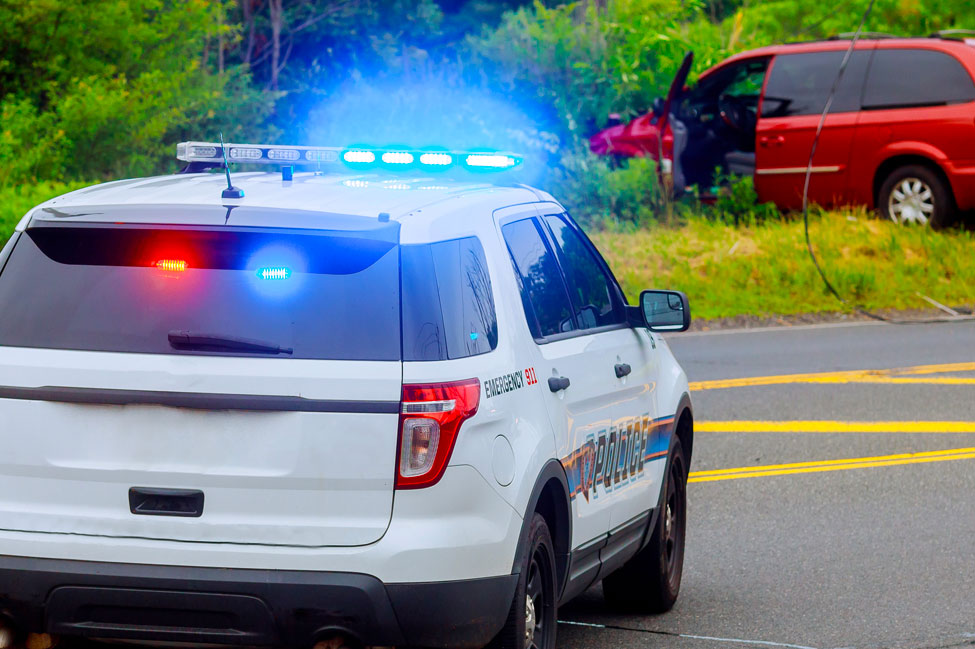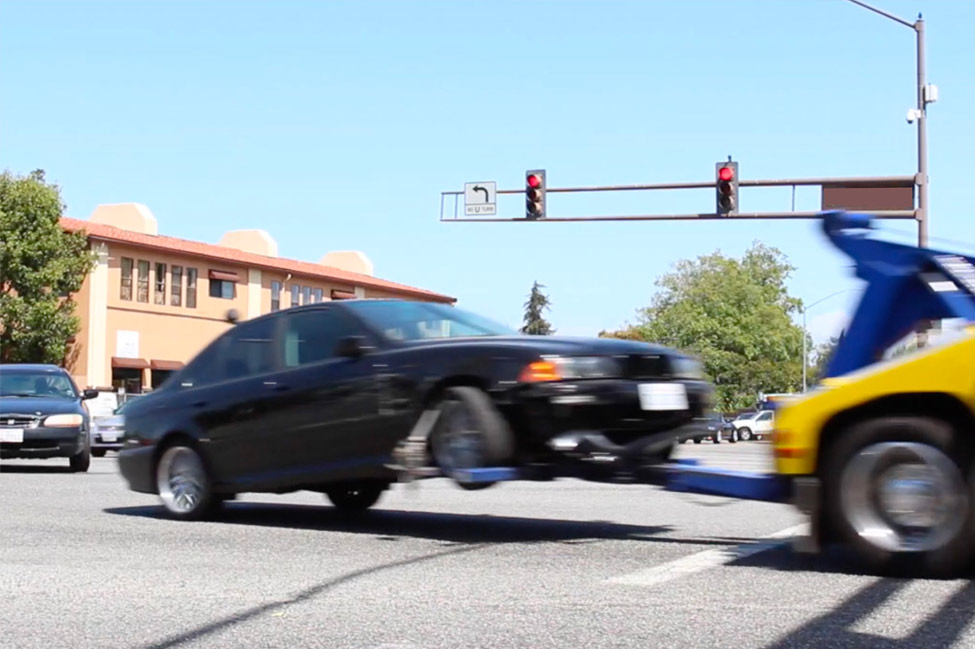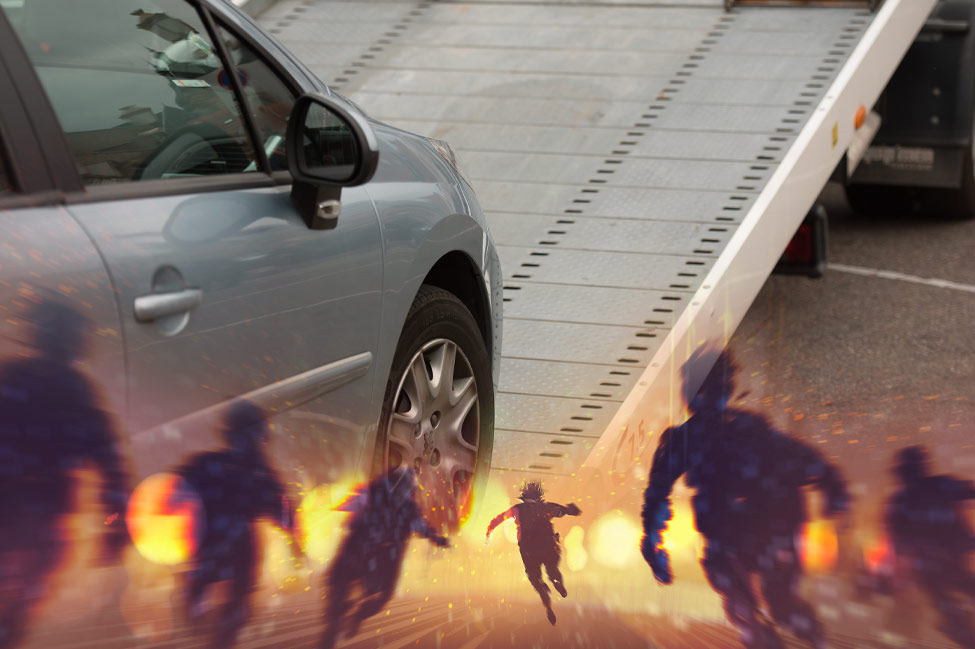Towing And Recovery Lessons Learned
A few years ago, we were working a tractor-trailer rollover that proved difficult. But it wasn’t the recovery that was the challenging part, it was getting paid for our services, that was the issue.
Allow me to explain…
The rain that night was relentless, and we were sick of it. The mangled trailer we were unloading was flat on its side while the road-tractor, somehow, was miraculously balancing on one wheel.
Unloading the cargo required a full crew of laborers, including the recovery team. We then had to palletize the hundreds of boxes of instant potatoes and mac & cheese, wrap everything up nice and tight, and then use a skid-steer to load the pallets it into our dry box. When that was done the fun could begin.
Ahh, the Recovery!!
With the rigging already in place, the recovery team did their part, up-righting the mangled mess in minutes. Now, with the tractor-trailer separated, loaded and secured to two heavies, it was time to head back to the yard. The hard part was almost over.
Or was it?
The next morning the owner of the wrecked rig came to the shop to assess the damages. The trailer was a gonner, he agreed, but the road-tractor, he surmised, could be fixed. So, he requested that we tow it to a repair shop some three hours away.
How To Get Your Towing Bill Paid
Many times, there are three insurance companies involved in a tractor-trailer rollover.
- There’s the insurance company for the road-tractor, and, if the trailer is not owned by the same person or company who owns the road-tractor…
- There will be an insurance company for the trailer.
- Also, then the cargo may be insured by an entirely different company.
The problem is this…Once the recovery is complete, the insurance companies will all come calling—asking that we separate the recovery, towing, and storage charges accordingly. How much for the road-tractor? How much for the trailer? And, sometimes, how much for the load?
When this happens, if you’re not careful, getting paid for your towing bill can be hard.
You see if Insurance Company A pays the separated charges for the cargo and you release the load…And, you’ve already towed the owner’s road-tractor to the repair shop without first getting paid for all of the outstanding towing and recovery charges, you may get stuck with a busted trailer (which has very little value) and quite possibly stuck with a partially unpaid bill.
When you release anything to the insurance companies or owners, (truck, trailer, or load) without being fully compensated, you’re diminishing your chances of ever collecting, because you’ve relinquished some of your collateral.
How To Get Your Towing Bill Paid First
First, know this, if you’re a “hard-ass” and demand payment before relinquishing their stuff, the insurance companies may accuse you of being unscrupulous. So, here’s what you should do after a car accident.
If you refuse to release their property before you receive compensation in full, the insurance companies may accuse you of “holding their cargo hostage.” Of course, a statement like that is an utterly ridiculous position for them to take but it may happen. And if it happens to you, I suggest that you not back down.
Think about it…Is Walmart holding the bread and milk, they sell in their stores, hostage? Is my insurance company holding my coverage hostage if I fail to pay my premiums? No, of course not.
When you encounter an insurance adjuster who thinks this way, state, “We are maintaining possession of the property to ensure we receive payment in full.”
In the situation described above the owner believed his property (the road-tractor) to be repairable. And, since downtime means loss of revenue for truckers, he wanted the truck towed to a repair shop as soon as possible.
However, as explained earlier, we needed it as collateral to avoid having an insurance company cherry pick our invoice. The real problem is…How do you tell that to the owner of the road-tractor?
A couple of ideas.
You could suggest that he pay your bill. The problem with this is, you and I know that trucking company owners have no idea what it costs to run a towing business. And, the owner would, most likely, fall over upon seeing the bill. But that’s what he has insurance for…right? He shouldn’t be paying the bill.
Rather than suggest that the property owner pay your tow bill, you could contact his insurance company as soon as possible.
How To Ensure You Receive Payment For Towing and Recovery Services
- Work up a bill as soon as you get to the office.
- Contract Labor: If you use contract labor, you must request invoices and pay them ASAP. (You want to ensure they show up next time) Which means you may need to get in contact with more than a handful of people to provide an invoice.
- Additional costs: Do you have any hazardous cleanup costs? Include those on your invoice. Will you be required to store any of the cargo or units inside?
- Costs Going Forward: Will you be required to unload the cargo from your dry box into another trailer? Are you renting the dry box or do you own it? And, even if you do own it, you can’t use it until the cargo is gone.
- Value Your Service: Remember…You provided a valuable service and should hand down every expense incurred as a result of the incident and its recovery. And, mark your costs up accordingly to ensure you remain profitable.
- Call the insurance agent.
After you have a bill worked-up for the entire towing and recovery services, call the property owner’s insurance company and ask to speak directly to the insurance agent handling the claim. Of course, this depends on if you know who the insurance company is. If you do not know, then a call to the tractor-trailer owner will be required to get this information. - Once you get in contact with the insurance agent handling the claim you must learn if…
- A Claim Has Been Made: Ask if the property owner has reported the incident, (in most instances it will be reported) then
- Ask the agent for the claim number(s) (remember, there may be more than one).
- Learn if all three components are insured together or separate, the truck, the trailer, and the cargo.
- Determine Who Is Paying For What: As mentioned earlier, there may be three separate insurance companies involved, so determine what is covered by each particular insurance company. If they do not cover all three portions of the incident, then call the property owner again and ask for the name of the other insurance company or companies.
- Freight Broker: If the property owner works with a freight broker, then you may need to contact the freight broker to determine who insures the cargo.
- Once you discover which insurance company is covering what, ascertain the adjuster’s name and number for each separate claim.
- Then call each adjuster and…
- Record Claim Numbers: Gather the claim numbers for each component,
- Submit An Invoice: Provide each adjuster with the appropriate portion of the invoice.
- Request Payment In Full: Request prompt payment in full for the towing and recovery services provided.
- Remember the invoiced amount at the time of the initial conversation will be for towing and recovery plus whatever daily storage fees have accrued to date. There may be additional charges going forward, like storage and other requested services. So, you will need to communicate those ongoing charges on your invoice in some way.
- Unless negotiated otherwise, or if local regulations prohibit it, storage costs will continue to accrue on a daily or hourly basis. I reiterate this point because it can help you to get paid faster. Communicate these fees to the insurance adjuster, as this creates a sense of urgency in their minds. The sooner they pay your bill, the less it will cost them.
How To Salvage The Relationship With The Property Owner
In some instances, the call to the adjusters will be too soon, and he or she will not be able to submit payment promptly. And, with no idea of when you will receive payment, you might feel like you’re stuck between a rock and a hard place, regarding your relationship with the property owner. Don’t despair, you still have options.
Out of a desire to maintain a good working relationship with the property owner, you may be motivated to go ahead and tow the road-tractor without receiving payment first. It’s up to you to determine the best course of action in each instance, but standing firm will help ensure you are fully compensated for the towing and recovery services provided.
If you’re still worried that you may ruffle some feathers in the process, try this.
A simple explanation of the issue may do the trick. Talk with the property owner and let him know that the insurance company hasn’t given you the OK to tow the road-tractor to the repair shop yet. Explain that a tow that far will incur substantial additional charges and that, if warranted the insurance company will be the one paying the bill.
Additionally, you could explain that many times, the insurance company will want to send an adjuster out first. They do this because they want to determine if the damages are too extensive for repair. If it is beyond repair, they won’t want to pay for a second tow to the repair shop only to be required to pay for a third tow to the salvage yard once it is determined to be a total loss.
Going the extra mile and attempting to gain understanding from the property owner doesn’t always work, but it may salvage your relationship while helping you to avoid being stuck with an unpaid bill.
Have you had similar challenges with your towing business? Join the conversation and help out the towing community by commenting below.






I am in search of the proper documents and procedures to recover payment for vehicles. Example vehicle been towed request by police no one shows up for it not sure who owner is etc. how do i get paid. Also would like to have proper demand for full payments of vehicles that have been towed, instead of them signinig over title and me never recovering tow fees impound charges. please help
Marjorie,
Each state has requirements that must be followed when performing non-consensual tows. I would suggest that you contact your state’s Department of Revenue or Department of Motor Vehicles, or what governing body that sets the rules and regulations for towing. Once you know what the requirements are for your state, then you can draw up the documents you need. Your state may even require and provide specific forms to be sent for notification, as does the state of Missouri. Good luck
be cheeper
try and help people
=====$$$$$$$$$$$$$$$
Pretty useful article you’ve managed to put together here, for anyone who’s gotten themselves into sticky situations with towing issues. I’m actually a towing business owner myself, and was just looking to brush up on my knowledge a bit, and taking a look around your site is definitely helping me out. Not sure if you hear it much, but your articles are greatly appreciated.
Thanks for the nice words.
We’ve been in the towing business for 30 years and have learned never to separate the cargo, tractor, and trailer towing/recovery charges. We provide a detailed narrative and photos to go with all of our invoices that explain exactly what each of our trucks did and the time they were on scene. Beyond that, it is up to the insurance companies to subrogate the bill themselves.
The exact statement for this is, “I’m sorry, we have ONE wreck and ONE bill. We are unable to release anything until the total bill for this accident is covered in full. We cannot subrogate the bill on behalf of the insurance companies or insured, but you’re welcome to do that between yourselves.
Works every time.
Suzy,
I love the wording you use. “…we have one wreck and one bill…”
Thanks for your help, I’m sure everyone who reads your comment will get value from it.
Ouch – just reading through the first couple of paragraphs here made me cringe, it sounds like a major headache for any towing company to have to deal with, and if all of that isn’t enough, getting paid is oftentimes a problem, just like you said! Definitely appreciate all the tips that you provided in this article, because it really can be difficult to figure out payment sometime, and I don’t want to cause an inconvenience for my customers, but I do want to get paid! Thanks for the info.
Oahu Towing Company,
Thanks for the nice words.
I think it is better to handle your bill right away! I mean i don’t see the point in delaying it like a lot of people I know.
Thank you for sharing this informative article.
Pretty useful article, thanks for taking the time to share your perspective mate.
Thanks, Jes, I hope all is well in Hawaii.
Hey Don, I was hoping you could provide some of your expertise. We tow wrecked vehicles often, and we live in a rural area where these vehicles are often uninsured and cheap, with little to no parts or resale value, meaning that even if we follow the law to gain title to the vehicle it tends to not be worth much as we simply sell them to a sccrapyard for ~$50. To our knowledge, the only recourse we have with these unclaimed vehicles is simply to gain title and scrap them, and I wondered if you know of another way to recoup our costs, or a way to pressure the owners of these unclaimed vehicles to come in and retrieve them or pay some/all of the towing bill. We are located in Missouri. Is there a way to put some kind of lien on the vehicle owners themselves in a way that would prevent them from registering a new vehicle, or some similar tactic that would impose consequences on the vehicle owner for failling to take financial responsibility for their vehicle?
Rob,
I operated my towing business in Missouri and experienced the same problems. I am unaware of any regulations that allow for a towing company to recoup damages from the vehicle owner in a liability only case. However, you may find some nuggets of wisdom in this recovery billing course. https://recoverybillingunlimited.com/ I’ve never been to the course but I’ve heard good things. Thanks
I have an unpaid recovery bill with a Trucking company from 6 months ago. Yesterday we recovered two more units for them that they want badly. Can I hold those units to get them to pay for the recovery from 6 months ago? I’m in Arizona.
Yvonne,
When discussing the term “recovery” in the towing industry, it can mean two things…accident recovery, or repossessing a vehicle. I’m not sure which one you’re referring to here. With regards to accident recovery, you have the law on your side. In Arizona, you can hold a vehicle until the tow bill is paid. However, holding a vehicle after services have been paid for, is not a good idea. And, it may be against the law…check your state statutes.
With regard to repossessions, one would think that the bank or whatever clearinghouse you’re working for would want to maintain a solid relationship with your company.
So, this leads me back to accident recovery. This means you released the property before you were paid…which is not a good idea unless you have a solid ongoing relationship with the trucking company (but it’s still not a good idea to release a vehicle until the services are paid for).
What I suggest you do to avoid breaking the law and any further conflict with this company is give the owner a call and remind them about the unpaid recovery bill. It may be something as simple as the insurance company is dragging their feet, and the trucking company owner doesn’t know. He may see the invoices you send and assume that the insurance company is already taking care of your bill. But, to avoid breaking the law, and risking your company’s reputation in the community, don’t hold units not related to your unpaid invoices as collateral.
I know it’s troublesome, but if they don’t pay the outstanding invoices take them to court. And, don’t hire a debt collector, they’ll take a huge percentage of whatever negotiated sum they’re able to collect.
Thanks and good luck
Super useful article you have wrote here Don Archer. This will gather alot of attention from towing operators and business owners in the towing industry. Thank you so much for the insight. Also Do you guys provide any sort of local seo services or do you have anyone who you might could recommend to us. Thank you Hook Em’ Up Towing
Thanks, and yes, we provide SEO services. Schedule a call to learn if your area is available. Thanks again.
Do you do a billing class?